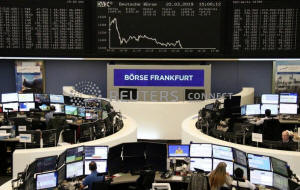|
Positive German data tempers equity
selloff, lifts bond yields
 Send a link to a friend
Send a link to a friend
 [March 25, 2019]
By Karin Strohecker [March 25, 2019]
By Karin Strohecker
LONDON (Reuters) - World stocks hit a
12-day trough on Monday as fears for economic growth sent investors
dashing for safe-haven assets, but the selloff lost some momentum after
better-than-expected data from Germany.
The Ifo Institute's March business climate index unexpectedly rose,
soothing nerves after Friday's dismal German manufacturing data, which
helped spark a global selloff that hammered stock markets and pushed key
benchmark bond yields below zero.
Crucially, an inversion in the U.S. bond yield curve on Friday had
stoked fears that the world's largest economy was headed for recession.
But the Ifo report lent some cheer. It helped European shares rise off
early lows. Paris traded flat, London's FTSE was down 0.2 percent, and
Frankfurt inched up 0.14 percent after the numbers. Europe's banking as
well as industrial goods & services sectors which were down 1 percent at
one point, recouped losses to trade flat by 950 GMT.

But the jitters were far from over.
"We had a dire end to 2018 which was then recouped so you have a very
good reason to lighten up on portfolios," said Marie Owens Thomsen,
chief economist at CA Indosuez in Geneva, adding that confusion over the
state of play in Britain's impending departure from the European Union
clouded the picture more.
"Many people may have realized a major part of their expected returns
for the year, so in light of recent gains it makes sense for investors
to should lighten up on risk."
The falls in Europe follow hefty tumbles in Asia. Japan's Nikkei hit a
five-week low after diving 3.1 percent for its largest one-day
percentage fall since late December. South Korea's Kospi index declined
1.7 percent, while China shares was also in the red with the blue-chip
CSI 300 index down 1.4 percent.
MSCI's gauge of stocks across the globe slipped 0.5 percent. The gloomy
mood was expected to spread to U.S. markets with S&P 500 futures
skidding 0.2 percent. However, they were down as much as 0.5 percent
earlier in the day.
The German data also helped Germany's benchmark 10-year bond yield move
back into positive territory.
Spreads between U.S. three-month and 10-year Treasury yields turned
positive. U.S. 10-year treasury yields stood at 2.7240 percent after
yields inverted for the first time since 2007 on Friday. Historically,
an inverted yield curve - where long-term rates fall below short-term -
has signaled an upcoming recession.
[to top of second column]
|

The German share price index DAX graph is pictured at the stock
exchange in Frankfurt, Germany, March 22, 2019. REUTERS/Staff

"The bond market price action is an enormous blaring siren to anyone
trying to be optimistic on stocks," JPMorgan analysts said in a note
to clients.
"Growth, and bonds/yield curves, will be the only thing stocks
should be focused on going forward, and it's very hard to envision
any type of rally until economic confidence stabilizes and bonds
reverse," it added.
Politics was also in focus in the United States and Britain.
U.S. Special Counsel Robert Mueller concluded after a long
investigation that nobody associated with President Donald Trump's
campaign conspired with Russia during the 2016 presidential
election, according to a summary issued by Attorney General William
Barr on Sunday.
Political turmoil in Britain over the country's exit from the
European Union also remains a drag on risk assets.
Prime Minister Theresa May held crisis talks with senior colleagues
and hardline Brexiteers on Sunday trying to breathe life into her
twice-defeated European divorce deal after reports her cabinet was
plotting to topple her.
Rupert Murdoch's Sun newspaper said in a front page editorial May
must announce on Monday she will stand down as soon as her Brexit
deal is approved.
The British pound was 0.2 percent lower after three straight days of
wild gyrations. The currency had slipped 0.7 percent last week.
The Japanese yen - a perceived safe haven - traded 0.25 percent
softer at 110.18 per dollar, knocked off earlier six-week highs.

In commodities, U.S. crude fell 13 cents to $58.91 per barrel. Brent
crude futures eased 22 cents to $66.81.
(Reporting by Karin Strohecker, additional reporting by Sujata Rao;
Editing by Hugh Lawson)
[© 2019 Thomson Reuters. All rights
reserved.]
Copyright 2019 Reuters. All rights reserved. This material may not be published,
broadcast, rewritten or redistributed.
Thompson Reuters is solely responsible for this content. |